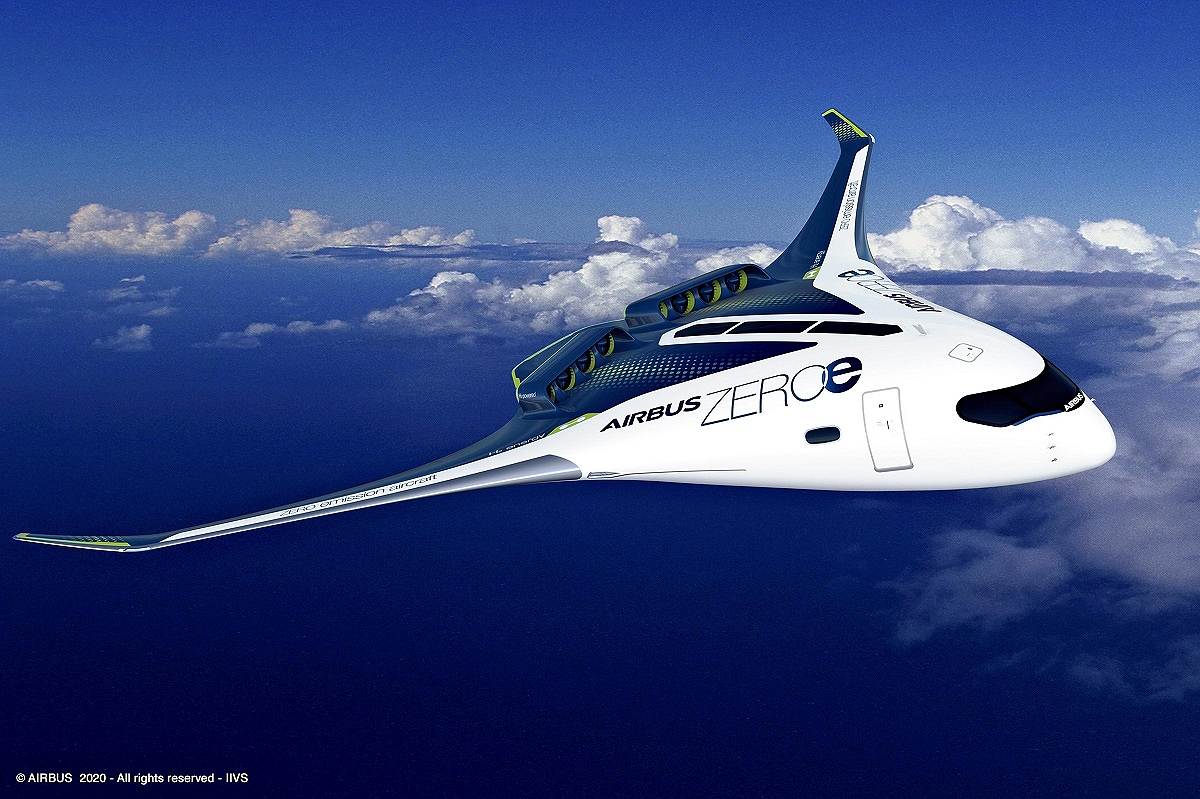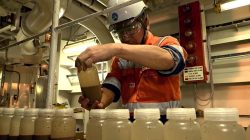
An image of a hydrogen-powered aircraft currently under development by Airbus S.A.S.
17:41 JST, December 24, 2020
Cutting carbon dioxide emissions from airplanes by half by 2050 compared to the 2005 level will be a goal, generating a ¥1 trillion economic impact within Japan, according to the government’s action plan targeted at the aviation industry, The Yomiuri Shimbun has learned.
Japan’s aviation-related firms will be urged by the government to develop key components for hydrogen-powered aircraft in an effort to realize a decarbonized society.
Conventional airplanes are powered by jet fuel, which is similar to light oil or kerosene. CO2 emission rates per passenger-kilometer of a plane are double that of a bus and more than five times more than that of a train. In recent years, there has been a worldwide movement called flight shame, which calls for the use of trains and other means of transportation instead of airplanes.
Overall, the transportation sector accounts for just under 20% of the nation’s total CO2 emissions, so the government has positioned the aviation industry as a priority area in its effort to reduce CO2 emissions.
There is a growing momentum for decarbonization in the industry. Airbus S.A.S., the European aircraft manufacturer, has started developing hydrogen-powered aircraft, aiming to commercialize them in 2035.
Japan will use the ¥2 trillion fund included in its third supplementary budget plan for this fiscal year to encourage Japanese companies to develop key components for hydrogen-powered aircraft. For existing aircraft, the government will push the development of electric components to make it possible to use both fuel and electricity as a source of power, as in hybrid vehicles, as well as the development of carbon fiber for airframes to make planes lighter.
The government will then encourage foreign governments and major aircraft manufacturers to adopt components developed by Japanese companies.
As for biofuels, which are derived from plant sources but are not counted as emitting CO2, they are not widely used due to their high cost. The government aims to reduce the cost of biofuels to the same level as jet fuel to put them into practical use by 2030.
As the production of aircraft, like automobiles, involves a wide range of industries, the moves could create a leap in employment. The government hopes that decarbonization will be a catalyst to nurture the aviation industry to be a new key industry in Japan.
Top Articles in Business
-

Prudential Life Insurance Plans to Fully Compensate for Damages Caused by Fraudulent Actions Without Waiting for Third-Party Committee Review
-

Narita Airport, Startup in Japan Demonstrate Machine to Compress Clothes for Tourists to Prevent People from Abandoning Suitcases
-

Asics Opens Factory for Onitsuka Tiger Brand in Western Japan
-

JR Tokai, Shizuoka Pref. Agree on Water Resources for Maglev Train Construction
-

KDDI Opens AI Data Center at Former Sharp Plant in Osaka Prefecture; Facility Will Provide Google’s Gemini AI Model for Domestic Users
JN ACCESS RANKING
-

Japan Institute to Use Domestic Commercial Optical Lattice Clock to Set Japan Standard Time
-

Israeli Ambassador to Japan Speaks about Japan’s Role in the Reconstruction of Gaza
-

Man Infected with Measles May Have Come in Contact with Many People in Tokyo, Went to Store, Restaurant Around When Symptoms Emerged
-

China Eyes Rare Earth Foothold in Malaysia to Maintain Dominance, Counter Japan, U.S.
-

Prudential Life Insurance Plans to Fully Compensate for Damages Caused by Fraudulent Actions Without Waiting for Third-Party Committee Review

























